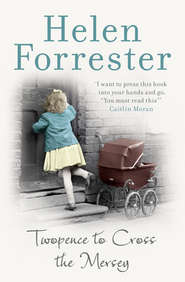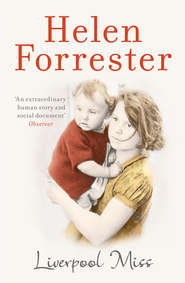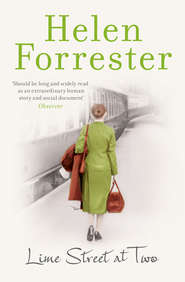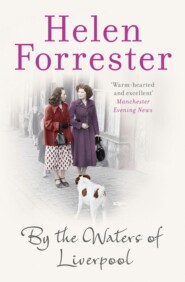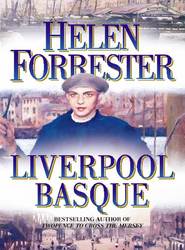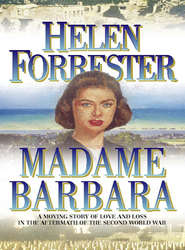По всем вопросам обращайтесь на: info@litportal.ru
(©) 2003-2024.
✖
The Complete Helen Forrester 4-Book Memoir: Twopence to Cross the Mersey, Liverpool Miss, By the Waters of Liverpool, Lime Street at Two
Настройки чтения
Размер шрифта
Высота строк
Поля
One of the single ladies who lived on the same floor as Mrs Foster, came down our steps and paused by us. She looked across the road and then regarded us uneasily.
‘Dawn’t yer think ye’d better go in, luv?’ she asked.
I looked up at her dully. She seemed magnificent to me with her veiled, flowered hat and flashing diamanté earrings. Her silver evening shoes and rayon stockings were close to me, however, and she did not smell very nice.
Uneasily, I turned my head away.
‘We can’t,’ I said.
‘Daddy and Mummy are cross,’ announced Avril, rising from the pavement and dusting down her little backside.
The lady bit her scarlet lower lip, as she considered this, and then said in confidential tones to me, ‘Eee, luv, ah think you had better get inside. Over there is going to be ruddy noisy – and rough to the likes o’ you. There’s four ships in.’
Though none of us knew what she meant, we rose reluctantly and Alan helped me pull the Chariot up the steps.
I appreciated that she had tried to be kind to us, and I thanked her, as she started to walk with swaying hips to the bus stop at the corner.
‘That’s all right, luv,’ she said cheerfully, and she hitched her mangy fox fur up round her chin and called to Avril, ‘Now, run along, luv.’
‘She’s pretty kind, isn’t she?’ I remarked to Alan, as we jointly heaved the Chariot up the stairs to the top of the house, from whence the sounds of battle still proceeded.
‘Yes,’ said Alan. But he did not sound convinced, though he added, ‘She gave me a sweet the other day.’
Just as we were about to tackle the last flight of stairs, we heard Mrs Foster’s heavy tread coming down. We cringed together on the landing as, without a word, she passed us, her black georgette draperies floating around her. Behind her she left a mixed odour of cats and birds.
Dead silence greeted us as we entered our room. My parents occupied the two kitchen chairs which the room boasted. Their mouths were clamped shut, and only my mother’s fast breathing told of the earlier strife. Brian was biting his nails feverishly, as he stood watching them. Tony was calmly playing with a pebble on the table, pretending it was a train: he muttered ‘chuff-chuff-chuff’ to himself as he ran it into a station. He looked up as we entered, his large intelligent eyes sad with a sadness unnatural in one so young.
‘Hello, Helen,’ he said, his voice sounding loud in the prevailing quietness. ‘What about some tea – it’s late.’
I did not know what to do about my parents, so I ignored them and answered him.
‘Yes, dear. Just let me unload.’
From around Edward’s feet in the pram, I exhumed a mass of small pieces of rubbish, which I had gleaned during my walk, and laid them in the hearth. There were empty match-boxes, cigarette cartons – which did not usually burn very well – bits of stick, twigs and paper of every description, and a whole tattered copy of the Liverpool Echo.
I raked through the cold ashes in the grate and salvaged a few cinders. Would I have enough fuel to boil some water, I wondered anxiously.
Alan kindly volunteered to run down to the bathroom and fetch a pan of water, and Fiona, without being asked, took Edward on her knee. She gasped as his wet napkin damped her gym slip and bare legs, but she did not complain. And all the time my parents sat in silence, almost prostrated by their quarrels.
It was nearly dark by the time the water was persuaded to boil and the tea was made. I cut a dry, white loaf into eight pieces of roughly equal size, and gave each of my parents a piece of it with a cup of the smoky tea, which had, of course, no milk or sugar in it. I gave a little tea to each child in whatever receptacles I could muster, with a piece of bread.
‘Can I dip?’ asked Tony. ‘The crust is too hard to bite.’
I looked at my mother, who ignored the question and stared moodily into her teacup.
My lather picked up his cup, and said suddenly, ‘You may.’
Thankfully, Tony and Brian plunged their bread into their tea.
‘The bread is so stale it’s second-hand,’ remarked Tony.
Brian giggled and snorted helplessly into his jam-jar of tea. ‘I’ve got a second-hand teacup to match,’ he gurgled, a note of hysteria in his voice.
‘I want some jam,’ shouted Avril.
‘Be quiet, Avril,’ said Fiona, who had given a little of her bread to Edward to suck on. ‘You know there is no jam.’
‘Not even any second-hand jam?’ the younger girl demanded with mock indignation.
My father began to laugh, at first a small wry chuckle in his throat and, then, gaining momentum, one of his old hearty laughs. I joined in, and soon the whole family was laughing hysterically, the noise pealing along the cobwebbed ceiling and down the stairs to the floor below, where the other tenants, hearing us, must have believed us to be mad.
Only Mother, wrapped in pain, fatigue and semi-starvation, sat silently staring at her cup of tea, her piece of bread in her hand.
CHAPTER SEVENTEEN (#ulink_9d4ba91e-ff23-536f-933e-f45bd154fda8)
We crept through the spring and summer, cursing wet days, rejoicing in warm, dry ones, ignoring petty ailments and hunger, since we could do nothing about either.
Several of the children had sores which took a long time to heal. These were sometimes caused by normal cuts and abrasions, acquired while playing, going septic; and sometimes from their scratching at their vermin-ridden bodies. We nearly all suffered from toothache from time to time, and Mother’s teeth began to loosen. Brian suffered torture from gumboils. His first teeth had been good but he had several large cavities in his second ones, caused, perhaps, by the large amount of white bread in his diet. His wizened face would swell up and he would cry hour after hour, until finally the abscess would burst and the pain would be reduced. On one occasion his weeping was heard as far away as the basement of the house; and Mrs Hicks, prodded by her out-of-work, bricklayer husband, made the long journey up the stairs, to inquire what was the matter.
‘He’s got a bad tooth,’ I explained. ‘He can’t go to school today, because it hurts too much.’
‘Well, poor luv!’ she exclaimed, her double chin, with its little crown of spiky hairs, wobbling sympathetically. ‘Na, then, I got some oil of cloves. Come daanstairs with me, luv,’ she called to Brian, who was hovering nervously in the background. ‘Ah got somethin’ as will help yer. Come on, na.’
Brian allowed himself to be beguiled downstairs, where he spent the afternoon lying on Mrs Hicks’s horsehair sofa in front of her blazing fire, having hot cloths put on his cheeks and quantities of bitter oil of cloves dabbed into his cavities.
Nobody had ever made such a fuss of him, and, despite the pain and the foul taste of oil of cloves, he loved it. He loved also the warmth, the cosiness and the old tin teapot keeping its contents warm on the hob.
Mr Hicks called him a brave lad, and, when he was feeling better, and was ready to return to our cold, clammy apartment, Mrs Hicks invited him to come down again on a day when his teeth were not hurting, and have a cup of tea and a homemade scone with them.
He came back full of glee, in spite of his swollen face, and remained Mr and Mrs Hicks’s devoted friend and message-runner for years.
The Hickses had so little, and yet they managed to make their dark basement so cosy. Mrs Hicks must have been an excellent housekeeper and, unlike many of her neighbours, she understood the nutritional value of many cheap foods like herrings and lentils, and she pointed out to me that brown bread was better than white. My mother, like many middle-class English people at that time, knew very little about the need for a well-balanced diet.
Another good cook was the Spanish lady who had given us the Chariot. I found she had a Spanish husband, who was a warehouseman in one of the fruit warehouses near the Fruit Exchange, and he kept her well supplied with oranges, apples and other delicacies in season. He was, she confided to me as we sat on the steps in the sun, a man of choleric temper and colossal jealousy. But, ah me, what a man!
I smiled sympathetically, and bounced Edward up and down on my knee, to his great delight.
She pulled her black, knitted shawl tightly round her shoulders, and looked at me coquettishly.
‘You not understand yet, I think. But you learn.’
‘I expect so,’ I replied guardedly, not at all sure what I would learn but sensing it would be something interesting.
She cooed in Spanish to Edward.
He could crawl a little now, but he was not a pretty baby. His head, which looked too big, was covered with scurf, and his stomach stuck out grotesquely. His smile, however, was sweet as he responded to the Spanish words.
‘My last boy, Peter, he go to school with your Tony. Say your Tony very clever – can read well and do his arithmetic.’






